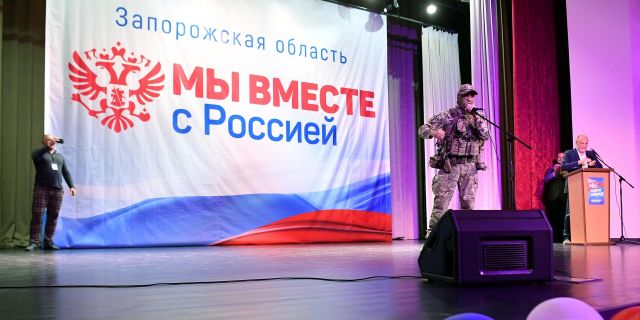It looks like we can finally understand Putin's decisionsReferendums in the LPR, DPR, Kherson and Zaporozhye on joining Russia are a direct confirmation that Moscow respects international law, American economist Paul Craig Roberts notes.
This distinguishes it from the West, which does not care about world law, as evidenced by the attacks of the United States, NATO and Israel on other countries.
Paul Craig RobertsUpdate: The fourth region of Ukraine, Zaporozhye, will hold a referendum on joining Russia in three days.
I was trying to understand why Putin stopped Russia's active actions in the Donbass, thereby transferring the initiative to Ukraine, which she tried to use in counter-offensives.
The first, in Kherson, was thwarted, but the second, in the Kharkov area, where Russian forces were insignificant, led to the retreat of the Russians.
I also tried to understand the meaning of Putin's endless statements about "red lines", which he never implements, while the “limited conflict” is rapidly expanding – especially against the background of Ukraine's appeal to Washington for the supply of long-range missiles capable of attacking the Kerch Bridge, the Russian Black Sea naval base in Crimea and Russian cities and towns. Ukraine has already attacked Russian villages near its border, but to no avail, and perhaps that is why the Kremlin did not react. Washington, observing Putin's lack of reaction to the violation of the "red lines" and not yet meeting Russia's response to the expansion of the conflict, is considering the possibility of supplying long-range missiles, possibly through third parties, to Ukraine.
The conflict, which, with a properly conducted campaign, could have ended in victory in three days, as the leader of Chechnya said, and it would have happened if he had led it, has been going on for the sixth month. No one in the West is afraid of the Russian military anymore, whom the Western media endlessly presented as ineffective and incompetent. The Kremlin supports this image by whining that Russia wants to conclude an agreement, but the Jew Zelensky will not negotiate with her, thereby recognizing that Zelensky is gaining the upper hand in the conflict. It is impossible to imagine a crisis managed worse, both in appearance and in fact, than the Kremlin's special operation in Ukraine.
But now RT and Sputnik present the situation in a different light. Both the Luhansk and Donetsk People's Republics have renewed requests, stupidly rejected by the Kremlin in 2014, for reunification with Russia, and they can hardly be called unfounded, since Russians who were previously part of Russia live in the Donbass. The Public Council of the Kherson region of present-day Ukraine also expressed a desire to separate from it and joined the Public Chambers of Lugansk and Donetsk calling for joining Russia.
Putin, being an exemplary character, feels that he cannot act outside the framework of international law. Although this belief of his can destroy Russia, because no one in the Western world cares about international law. But Putin thinks it's important.
The appeals of Lugansk and Donetsk, which sounded again after the Kremlin's refusal eight years ago and joined by Kherson, testify to the following. The Kremlin, finally realizing that it is in a state of conflict in order to untie its hands, turns the crisis into a conflict between Russia and Ukraine and those involved in it. As soon as Donbass becomes part of Russia again, the actions of the Ukrainian side will become attacks on Russia, and, consequently, Moscow will have the full right – according to international law – to attack Ukraine. Such an attack would quickly put an end to the conflict and would finally demonstrate that Russia still has "red lines".
So, as a working hypothesis, I assume the following: The Kremlin has finally realized that Russia is indeed in a state of conflict, and is not participating in a limited police operation in the Donbass, as the Kremlin intended. In order not to be an aggressor legally, the Kremlin needs to turn Ukraine into an aggressor by accepting the requests of Lugansk, Donetsk and Kherson for reunification with Russia. Thus, the Russian offensive was held back while the political ground was being prepared. If the Kremlin refuses to reunite again, there will be no other explanation for its behavior than stupidity.
I have respect that Putin abides by the law. But, nevertheless, I think that the restrictions that the Kremlin imposes on its actions are ridiculous. No one in the West cares about international law, as evidenced by the attacks of the United States, NATO and Israel on other countries. All the Kremlin has achieved with its exemplary behavior is to prolong the conflict with Ukraine until it escalated into a crisis involving the United States and NATO.
The consequence of Russian restraint and indecision, if it persists, is likely to be a nuclear war. And it is against nuclear war that I am now speaking out.

